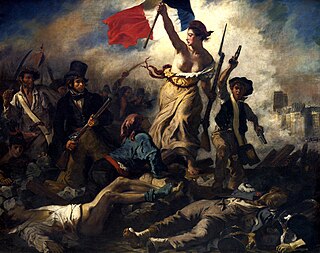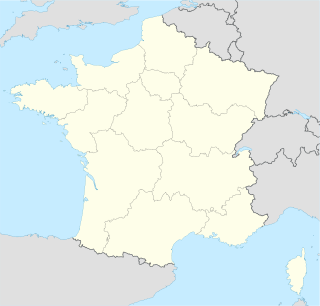
The French Revolution was a period of radical political and societal change in France that began with the Estates General of 1789, and ended with the formation of the French Consulate in November 1799. Many of its ideas are considered fundamental principles of liberal democracy, while the values and institutions it created remain central to French political discourse.
A Jacobin was a member of the Jacobin Club, a revolutionary political movement that was the most famous political club during the French Revolution (1789–1799). The club got its name from meeting at the Dominican rue Saint-Honoré Monastery of the Jacobins. The Dominicans in France were called Jacobins because their first house in Paris was the Saint Jacques Monastery.

The Bourbon Restoration was the period of French history during which the House of Bourbon returned to power after the first fall of Napoleon on 3 May 1814. Briefly interrupted by the Hundred Days in 1815, the Restoration lasted until the July Revolution of 26 July 1830. Louis XVIII and Charles X, brothers of the executed King Louis XVI, successively mounted the throne and instituted a conservative government intended to restore the proprieties, if not all the institutions, of the Ancien Régime. Exiled supporters of the monarchy returned to France but were unable to reverse most of the changes made by the French Revolution. Exhausted by decades of war, the nation experienced a period of internal and external peace, stable economic prosperity and the preliminaries of industrialization.

The Society of the Friends of the Constitution, renamed the Society of the Jacobins, Friends of Freedom and Equality after 1792 and commonly known as the Jacobin Club or simply the Jacobins, was the most influential political club during the French Revolution of 1789. The period of its political ascendancy includes the Reign of Terror, during which well over 10,000 people were put on trial and executed in France, many for political crimes.

Jacques Pierre Brissot, also known as Brissot de Warville was a French journalist, abolitionist, and revolutionary leading the faction of Girondins, in the National Convention.
In the historiography of the French Revolution, the Thermidorian Reaction is the common term for the period between the ousting of Maximilien Robespierre on 9 Thermidor II, or 27 July 1794, and the inauguration of the French Directory on 2 November 1795.

The historiography of the French Revolution stretches back over two hundred years. Contemporary and 19th-century writings on the Revolution were mainly divided along ideological lines, with conservative historians condemning the Revolution, liberals praising the Revolution of 1789, and radicals defending the democratic and republican values of 1793. By the 20th-century, revolutionary history had become professionalised, with scholars paying more attention to the critical analysis of primary sources from public archives. From the late 1920s to the 1960s, social and economic interpretations of the Revolution, often from a Marxist perspective, dominated the historiography of the Revolution in France. This trend was challenged by revisionist historians in the 1960s who argued that class conflict was not a major determinant of the course of the Revolution and that political expediency and historical contingency often played a greater role than social factors. In the 21st-century, no single explanatory model has gained widespread support. The historiography of the revolution has become more diversified, exploring areas such as cultural histories, gender relations, regional histories, visual representations, transnational interpretations, and decolonisation. Nevertheless, there persists a very widespread agreement that the French Revolution was the watershed between the premodern and modern eras of Western history.
Albert Marius Soboul was a historian of the French Revolutionary and Napoleonic periods. A professor at the Sorbonne, he was chair of the History of the French Revolution and author of numerous influential works of history and historical interpretation. In his lifetime, he was internationally recognized as the foremost French authority on the Revolutionary era.

François Furet was a French historian and president of the Saint-Simon Foundation, best known for his books on the French Revolution. From 1985 to 1997, Furet was a professor of French history at the University of Chicago.
The aim of a number of separate policies conducted by various governments of France during the French Revolution ranged from the appropriation by the government of the great landed estates and the large amounts of money held by the Catholic Church to the termination of Christian religious practice and of the religion itself. There has been much scholarly debate over whether the movement was popularly motivated or motivated by a small group of revolutionary radicals. These policies, which ended with the Concordat of 1801, formed the basis of the later and less radical laïcité policies.
Alfred Bert Carter Cobban was an English historian and Professor of French History at University College, London, who along with prominent French historian François Furet advocated a classical liberal view of the French Revolution.

Peter McPhee is an Australian academic and former provost of the University of Melbourne. He is the first person to have held the position at Melbourne, as it has typically only been in place at universities in the United States and the United Kingdom.

The military career of Napoleon Bonaparte spanned over 20 years. He led French armies in the French Revolutionary Wars and later, as emperor, in the Napoleonic Wars. Despite his rich war-winning record, Napoleon's military career ended in defeat. Napoleon has since been regarded as a military genius and one of the finest commanders in history. His wars and campaigns have been studied at military schools worldwide. He fought more than 80 battles, losing only eleven, mostly towards the end when the French army was not as dominant. The French dominion collapsed rapidly after the disastrous invasion of Russia in 1812. Napoleon was defeated in 1814 and exiled to the island of Elba, before returning and was finally defeated in 1815 at Waterloo. He spent his remaining days in British custody on the remote volcanic tropical island of Saint Helena.
For his life and a basic reading list see Napoleon I of France

Historians since the late 20th century have debated how women shared in the French Revolution and what impact it had on French women. Women had no political rights in pre-Revolutionary France; they were considered "passive" citizens, forced to rely on men to determine what was best for them. That changed dramatically in theory as there seemingly were great advances in feminism. Feminism emerged in Paris as part of a broad because of demand for social and political reform. These women demanded equality to men and then moved on to a demand for the end of male domination. Their chief vehicle for agitation were pamphlets and women's clubs, especially the Society of Revolutionary Republican Women. However, the Jacobin element in power abolished all the women's clubs in October 1793 and arrested their leaders. The movement was crushed. Devance explains the decision in terms of the emphasis on masculinity in wartime, Marie Antoinette's bad reputation for feminine interference in state affairs, and traditional male supremacy. A decade later the Napoleonic Code confirmed and perpetuated women's second-class status.
The French Revolution had a major impact on Europe and the New World. Historians widely regard the Revolution as one of the most important events in European history. In the short-term, France lost thousands of its countrymen in the form of émigrés, or emigrants who wished to escape political tensions and save their lives. A number of individuals settled in the neighboring countries, while some settled in Russia, and many also went to Canada and the United States. The displacement of these Frenchmen led to a spread of French culture, policies regulating immigration, and a safe haven for Royalists and other counterrevolutionaries to outlast the violence of the French Revolution. The long-term impact on France was profound, shaping politics, society, religion and ideas, and politics for more than a century. The closer other countries were, the greater and deeper was the French impact, bringing liberalism, but also practices such as direct democracy and revolutionary terror along with the end of many feudal or traditional laws and practices. However, there was also a conservative counter-reaction that defeated Napoleon, reinstalled the Bourbon kings, and in some ways reversed the new reforms.
Between 1793 and 1815, under the rule of King George III, the Kingdom of Great Britain was the most constant of France's enemies. Through its command of the sea, financial subsidies to allies on the European mainland, and active military intervention in the Peninsular War, Britain played the central role in Napoleon's downfall even as all the other major powers switched back and forth.
Suzanne M. Desan is an American historian. She is the Vilas-Shinner Professor of History at the University of Wisconsin-Madison, and the author or editor of four books on French history.

This is a list of works which deal with France and its geography, history, inhabitants, and culture.









